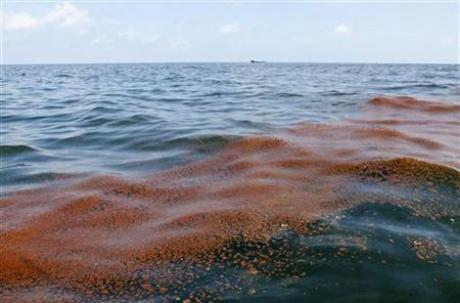Canadian Legislators Grill BP Over Arctic Drilling
Country: CANADA
Author: David Ljunggren

A band of oil from the BP oil spill off the coast of Louisiana
floats in the water near Freemason Island May 7, 2010.
Photo: Rick Wilking
Exasperated Canadian legislators grilled the head of BP Plc Canadian unit on Thursday, concerned about the risks of the company's plans to drill in Arctic waters after the catastrophic Gulf of Mexico oil spill.
But Anne Drinkwater, president of BP Canada, offered few answers at a hearing at Parliament's Standing Committee on Natural Resources on the safety of drilling in the Far North.
Drinkwater, who has also run BP operations in Indonesia, Angola and Norway, declined to answer technical questions and said she had not compared Canadian and U.S. drilling regulations, straining the credulity of some on the committee.
"You'd think coming to a hearing like this that British Petroleum would have as many answers as possible to assure the Canadian public. We got nothing today from them," said Nathan Cullen of the left-leaning New Democrats.
"I was very disappointed. I think British Petroleum is going to have to do a lot better job if they want to drill in Canadian waters," Cullen told reporters afterward.
Larry Bagnell of the Liberals, after asking Drinkwater to compare regulations in Canada and the United States, said: "I thought she didn't have answers to a lot of questions ... I was asking for a very simple answer."
Critics say an oil blowout in the Canadian Arctic would be much worse than the current Gulf disaster, given the ice, severe weather conditions and the lack of infrastructure in one of the world's most remote regions.
In 2008, BP paid C$1.2 billion ($1.8 billion) for rights to explore three parcels in Canada's Beaufort Sea, north of the Arctic Circle.
It has yet to announce plans to drill in the region but shortly before the U.S. disaster, BP and other oil companies urged Canadian regulators to drop a requirement stipulating that companies operating in the Arctic had to drill relief wells in the same season as the primary well.
Cullen argued the companies had made this request because drilling a relief well within the required time limit would be too expensive, given the difficult Arctic conditions.
"It's not a question of cost," said Drinkwater.
"Your submission does say it's a question of cost. ... You cite money because you're concerned about money," retorted Cullen, reading from a BP document filed with the NEB, then listing recent disasters BP had been involved in.
Drinkwater -- who said BP was not rejecting the option of a relief well -- declined to answer reporters' questions following the hearing.
Canadian governments and regulators are reassessing the country's preparedness for an offshore disaster following the April 20 explosion of Transocean Ltd's Deepwater Horizon drilling rig. The explosion killed 11 workers and triggered what could prove to be the worst U.S. oil spill if the crude keeps spewing unchecked into the Gulf.
The National Energy Board, Canada's federal oil and gas regulator, launched a review of Arctic safety and environmental drilling requirements this week and canceled hearings into the relief well issue. NEB Chief Executive Gaetan Caron said it was too early to say what the review might conclude.
Asked whether a similar accident could happen in the Arctic, Caron replied: "No safety regulator can possibly say that an accident will never happen."
Provincial governments are also reviewing offshore drilling regulations. The government of Nova Scotia on Thursday extended a moratorium on oil and gas exploration on the Georges Bank, an important fishing region, by three years to the end of 2015.
The government of Newfoundland is also launching a review of offshore safety practices, though it said it is satisfied with the current level of environmental protection practiced by the industry.
Indeed, Chevron Corp earlier this week began drilling a deepwater well in the Orphan basin off the province.
The Atlantic off Newfoundland is home to Canada's three producing oil projects.
(Additional reporting by Scott Haggett)
© Thomson Reuters 2010 All rights reserved
